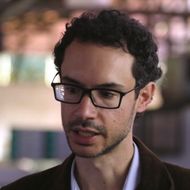Achieving Financial Independence: Experts Discuss Development of BRICS National Currency Settlements

How can BRICS countries move away from the dollar in international settlements, and what can they do to advance this goal today? These questions were discussed by experts during a round table at HSE University. The event was organised by the Multilateral Strategic Projects Office together with the HSE Faculty of World Economy and International Affairs as part of HSE’s activities within the BRICS Network University and the Joint Basic Research Projects ‘International Academic Cooperation of HSE University.’

Bruno de Conti
Despite efforts to introduce new currencies into international trade, the dollar is still used in 88% of transactions, noted Bruno de Conti, Professor of Economic Theory at the University of Campinas. This means that only 12% of transactions are conducted in national currencies. ‘The South African rand accounts for 1%, the Brazilian real has the same share, and due to sanctions, there are virtually no transactions in roubles. These figures are negligible compared to BRICS’ importance to the global economy,’ he said. Active steps to challenge the dollar’s dominance are being taken, particularly in China: the share of the Chinese yuan has risen from almost zero in 2007 to 7%. ‘There are bilateral initiatives within BRICS, and this is important especially now that BRICS is expanding,’ Bruno de Conti added.
He quoted Brazilian President Luiz Inácio Lula da Silva, who said in 2023 that he constantly wonders why all countries are forced to support the dollar instead of trading in their own currencies. According to the scholar, changing the situation requires addressing internal BRICS challenges—such as inertia and the difficulty of reconciling diverse national interests. Overcoming internal disagreements and strengthening digitalisation are essential steps forward.

Alexandra Morozkina
Alexandra Morozkina, Associate Professor at the HSE Faculty of World Economy and International Affairs, noted that the use of BRICS currencies in international trade is expanding. The share of the yuan in China’s international trade increased from 15% in 2021 to 28% in 2024. ‘The share of the rouble in total Russian exports grew from 12% in 2022 to 41% in 2024,’ she said. In 2023, a landmark deal took place: the yuan was used for the first time to settle oil transactions between the UAE and China. Increasing the liquidity of national currencies is a step towards de-dollarisation, and BRICS is gradually building the necessary infrastructure for it. ‘The BRICS Grain Exchange is also a step towards setting prices in BRICS currencies,’ Alexandra Morozkina explained.

Alexey Ponomarenko
Alexey Ponomarenko, Professor at the HSE Joint Department with the Bank of Russia, presented a concept for creating a closed international settlement system and discussed in detail models for such settlements, using the Mariana Project as an example. He pointed out that in designing such a system, the requirements for a single technical settlement unit are minimal, meaning that no specific changes to the monetary systems of participating countries would be necessary. Prof. Alexey Ponomarenko emphasised the importance of automatically determining exchange rates—a mechanism that could naturally regulate payment flows.
The round table was moderated by Olga Biryukova, Associate Professor at the HSE Faculty of World Economy and International Affairs. Anastasia Vyskubina, Head of the Online Project Support Department at HSE University, also took part in the discussion.
See also:
‘Regulators Must Understand That Absolute Predictability is Unattainable’
On October 10–11, 2025, the BRICS Competition Law and Policy Centre at HSE University (the BRICS Centre) hosted a two-day international seminar, ‘Platform Economy: Competition Law and the Market Power of Digital Platforms,’ in Tashkent, Uzbekistan. The event brought together competition authorities from BRICS+ nations and leading antitrust experts from around the world.
Experts from HSE University and BRICS Anti-Monopoly Authorities Analyse Global Grain Market
The International BRICS Competition Law and Policy Centre at HSE University presented the scientific report ‘From Fields to Futures: Competition, Financialisation, and Digitalisation in Global Grain Value Chains.’ The document was prepared as part of expert support from the BRICS Working Group on Competition Research in Food Markets. The presentation took place at the academic conference ‘Emerging Challenges of Competition Law and Policy in the BRICS and Beyond’ on September 12, 2025, in Cape Town (South Africa), which the BRICS Centre organised together with the University of Cape Town on the sidelines of the 9th BRICS International Competition Conference.
HSE Launches Training for Future BRICS Experts
From August 20–23, 2025, the Artek International Children’s Centre (Crimea, Russia) hosted an off-site session of HSE University’s educational and outreach project BRICS International School: New Generation. The school was the first event to take place under the cooperation agreement signed this year between HSE University and Artek.
HSE University and University of Campinas Join Forces to Build Alternative Financial System
HSE University and the University of Campinas (UNICAMP, Brazil) have announced the launch of a major joint research project to develop new approaches to an alternative international financial system. The initiative, which brings together leading experts in global economics and finance, seeks to analyse the current state of international financial architecture and explore ways of transforming it in the context of a changing geopolitical landscape.
HSE University to Host BRICS International School: New Generation
Registration for the BRICS International School: New Generation, one of the leading international educational projects aimed at prospective leaders interested in the agenda of global development and cooperation within the framework of BRICS, has opened.
Experts Assess How BRICS Countries’ Education Systems Are Evolving
The BRICS Expert Council–Russia, based at HSE University and operating in collaboration with the HSE Institute of Education, has released an analytical report titled ‘The Transformation of General Education in BRICS Countries.’ The study explores how BRICS nations are addressing shared challenges, including equitable access to schooling, digital integration, support for inclusion, linguistic diversity, and intercultural dialogue.
‘Artificial Intelligence Has Become the Lifeblood of the Global Economy’
Experts from HSE University took part in the BRICS Academic Forum (FABRICS) held in the capital of Brazil this year. The main theme of the event was to discuss cooperation among countries in the Global South amid geopolitical turbulence and rapid technological change. Academics and experts from BRICS member states and partner nations explored topics such as global healthcare, AI technologies, trade, climate change, and reform of the multilateral global security and governance architecture.
Roundtable on Russia–China Cooperation in Antimonopoly Policy Held at HSE University
HSE University hosted a roundtable titled ‘New Challenges for Antitrust Regulation: The Chinese Perspective.’ The event was organised by the International BRICS Competition Law and Policy Centre (BRICS Centre). Special guests included Chinese colleagues from the Competition Policy and Assessment Centre (CPAC) of the State Administration for Market Regulation of the People’s Republic of China (SAMR). Last year, the BRICS Centre and CPAC SAMR signed an agreement on strategic cooperation.
‘The Trip Exceeded All Our Expectations’: HSE Students Take Part in BRICS Youth Innovation Summit 2025
The BRICS Youth Innovation Summit 2025 was held in Cape Town on April 10–11, 2025. The event was attended by political and business leaders from Brazil, Russia, India, China, and South Africa. The summit focused on the theme ‘Innovating the Future: Technology for Sustainability and Social Good,’ under which the participants presented their projects. Students of the Faculty of Economic Sciences have shared their experiences of the trip to South Africa, their presentations at the BRICS summit, penguin encounters, and more!
HSE’s Education Observatory Establishes Research Network Across All BRICS Countries
The International Education Observatory initiative, launched by HSE University to focus on expert evaluation, analytics, and joint scientific research, has successfully completed the formation of a research network across all BRICS nations. South Africa was the final link, with the University of Pretoria and the University of the Witwatersrand joining experts from Russia, China, India, and Brazil.


